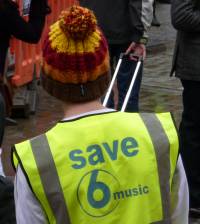Once it’s online, it’s there for the taking
 An experience this week has reminded me of one of the internet’s truisms: once you’ve put something online, you can’t control how it gets used.
An experience this week has reminded me of one of the internet’s truisms: once you’ve put something online, you can’t control how it gets used.
Along with a few hundred other people, I went down to the BBC’s Broadcasting House last weekend to protest against the closure of BBC 6 Music.
While I was there, I snapped a bunch of photos and put them up on Flickr.
They’re not great shots, but nonetheless the Love 6 Music website wanted to use them. Fair enough, I thought. After all, I support what they’re trying to achieve. Some of my pictures duly appeared on the site.
The next day The Guardian covered the protest – and included some of my photos in a gallery, all credited to www.love6music.com. It turns out the people behind the campaign had spoken to The Guardian and allowed them to use the pictures.
Now, initially I was taken aback by this. I felt I’d given permission for the photos to be used on a non-profit campaigning website, not on a commercial newspaper’s site.
However, once I thought it through, I realised I’d been pretty vague – I’d given permission in an easily-misinterpreted tweet which didn’t really explain under what circumstances I’d be unhappy with the photos being used:
“Sure, be my guest [to use the photos]! They’re all Creative Commons anyway.”
I allow most of my photos on Flickr to be used for non-commercial purposes under a system called Creative Commons. However, I’ve never wanted commercial websites to use my pictures for free. It’s the same for my writing; if someone’s making money from my work in some way, I expect to get paid.
Anyway, in this case I decided to bend my principles a bit. It is pretty cool to have your pictures on a national newspaper’s website, and I care a lot about the survival of this particular radio station, so I emailed The Guardian and asked for a credit, which they duly added.
So, all’s well that ends well? Yes, in this case. But it goes to show just how hard it is to keep tabs on your digital content.
It doesn’t matter if it’s words, pictures, video or sound – someone can always grab it and use it the way they want. And even though technically you keep the copyright and can forbid people from using it, in practice it’s hard to even find out it’s happened.
That’s a pain where your professional work is concerned. But when it’s personal photos, musings or other stuff you absolutely have to keep control of, you’re better off not putting it online in the first place. That’s the only way to be 100% certain it’s not being used in ways that make you unhappy.
The specific lesson I learnt in this case is that when someone is nice enough to ask permission before taking your content, always make your answer specific. If you’re not happy for them to pass your stuff on for publication on other websites, tell them. Because if you don’t, you can’t really complain when your content starts popping up in unexpected places.

I completely agree with “Once you’ve put something online, you can’t control how it gets used”. Strangely enough I have written a similar post today because I Googled myself, to see how I was indexed, and a Twitpic I had used to send to my friends ended up in a story in the Daily Mail about how I was stranded with 2000 people in Machu Picchu. Hilarious!! However…the world is changing and there is a lesson to be learned…if you don’t want people to see it then don’t put it online.
Keep up the good work.
Katrina